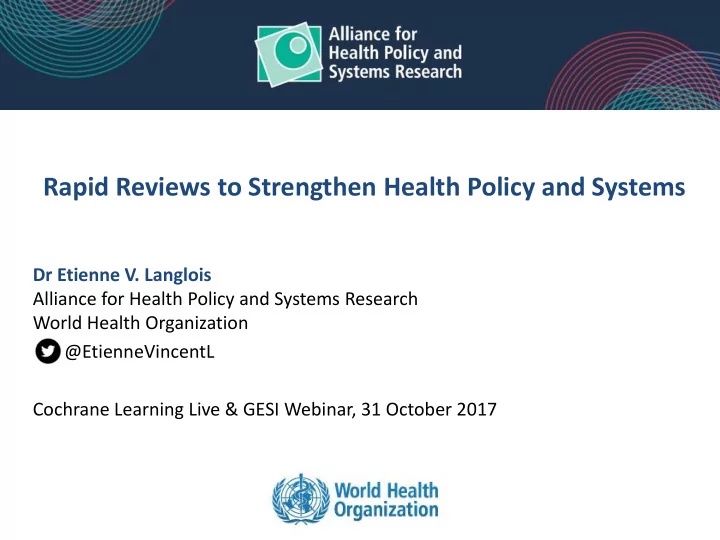

Rapid Reviews to Strengthen Health Policy and Systems Dr Etienne V. Langlois Alliance for Health Policy and Systems Research World Health Organization @EtienneVincentL Cochrane Learning Live & GESI Webinar, 31 October 2017
Webinar Objectives ➢ Discuss the usefulness of rapid reviews and their application to health policy and systems decisions ➢ Explore different rapid review methods ➢ Describe how to engage knowledge users in the conduct of rapid reviews ➢ Compare similarities and differences across EVIPNet- affiliated rapid evidence services
Rapid Reviews for Health Policy and Systems ➢ Increasing demand for relevant and context-sensitive evidence to strengthen health policy and systems worldwide ➢ Policy-makers and health systems managers require reviews that address a range of issues: - effectiveness of health systems interventions and policies; - how and in what settings these interventions work; - cost-effectiveness ➢ Three important barriers to conduct of systematic reviews and uptake of review findings into policy and practice: ✓ Timeliness ✓ Relevance ✓ Efficiency
Rapid Reviews for Health Policy and Systems ✓ Rapid reviews: useful approach to provide actionable and relevant evidence in a timely and cost-effective manner ✓ Rapid reviews often stem directly from requests by end-users: demand-driven feature contributes to their usability to strengthen local health systems and respond to pressing policy decisions. ✓ Efficient approach to generating the necessary context-sensitive knowledge needed to inform decisions on health systems questions ✓ Useful in emergency response as well as routine decision-making
Rationale for the Practical Guide ➢ Lack of guidance on “when” and “how” to conduct rapid reviews within the context of health policymaking and health systems strengthening ➢ Need to collate good practices on the conduct, contextualization, and use of rapid reviews, particularly in relation to complex health policy and systems evidence ➢ Need for open access material/tools to strengthen the capacity for the conduct and use of rapid reviews in low- and middle-income countries For the purpose of this guide: ➢ Rapid review: type of knowledge synthesis in which systematic review processes are accelerated and methods are streamlined to complete the review more quickly than is the case for typical systematic reviews.
Rapid Reviews to Strengthen Health Policy and Systems: A Practical Guide Practical Guide: ✓ Introduces to usefulness of rapid reviews for policy and systems decisions ✓ Explores different approaches and methods for the expedited synthesis of health policy and systems research; ✓ Provides hands-on guidance on how to plan, conduct, and promote the use of rapid reviews; ✓ Includes practical examples of rapid reviews for health policy and systems ✓ Outlines challenges and research agenda
Need for rapid reviews of health systems evidence • Conflict in Syria: breakdown in critical infrastructure including water and sanitation systems, scale of population displacement, loss of trained healthcare workers, equipment shortages and overall reduced health system functionality rapid spread of communicable diseases • Syria Public Health Network identified a need for up-to-date and context-sensitive evidence on communicable diseases prevention and control measures in warn-torn Syria • Rapid review to: - Describe trends in major communicable diseases during the on-going conflict, and - Document the challenges to outbreak and infectious disease management in the context of Syria Photo Credit: WHO Syria/ Karam Al-Masri
Key features of rapid reviews ➢ Rapid reviews are generated through a transparent, scientific, and reproducible method that respects the key principles of knowledge synthesis. ➢ Various approaches to enhance the timeliness of reviews: ✓ Knowledge synthesis shortcuts ✓ Automation ✓ Intensification of review steps ➢ Main challenge : accelerating review methods while maintaining robustness and transparency ➢ Timeframe: Rapid reviews : 5-12 weeks vs. Standard systematic reviews: 12-24 months (Tricco et al. 2015)
Rapid scoping review Medical malpractice policies in obstetrics
Key challenges and research needs • What the Practical Guide is not: One-size-fits-all approach to rapid reviews of health systems evidence ✓ Key challenges, including : - Complexity of health systems evidence, - Conduct and application of rapid reviews in low- and middle- income countries ✓ Research agenda - Potential risk of biases introduced by rapid review methods; - External validity as applied to rapid reviews and the broader field of health systems research synthesis.
Practical Guide available now (open access): http://www.who.int/alliance-hpsr/ resources/publications/rapid-review-guide/en/ Many thanks langloise@who.int +41 (0)22 79 133 10
Recommend
More recommend